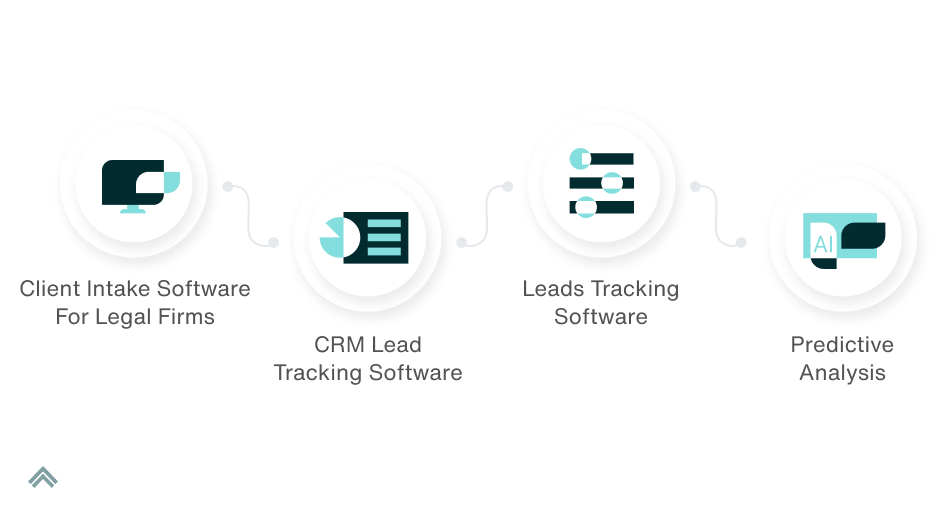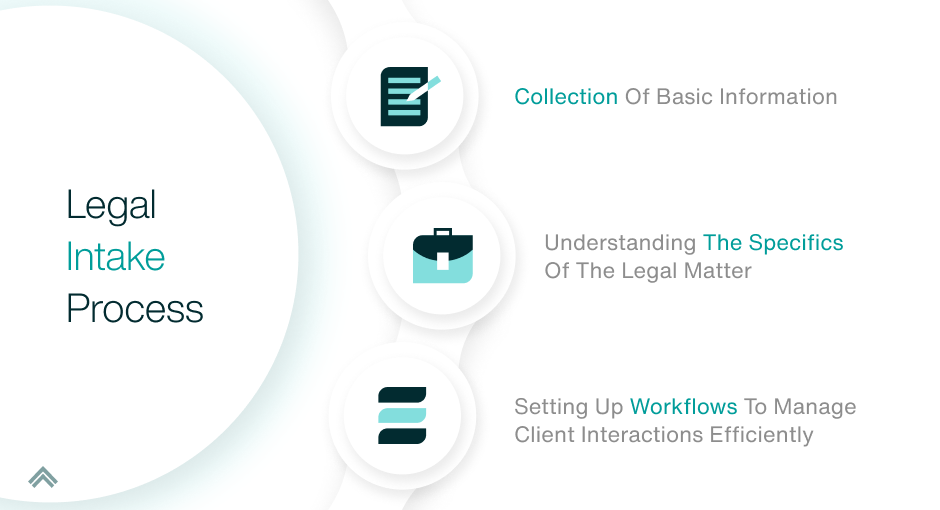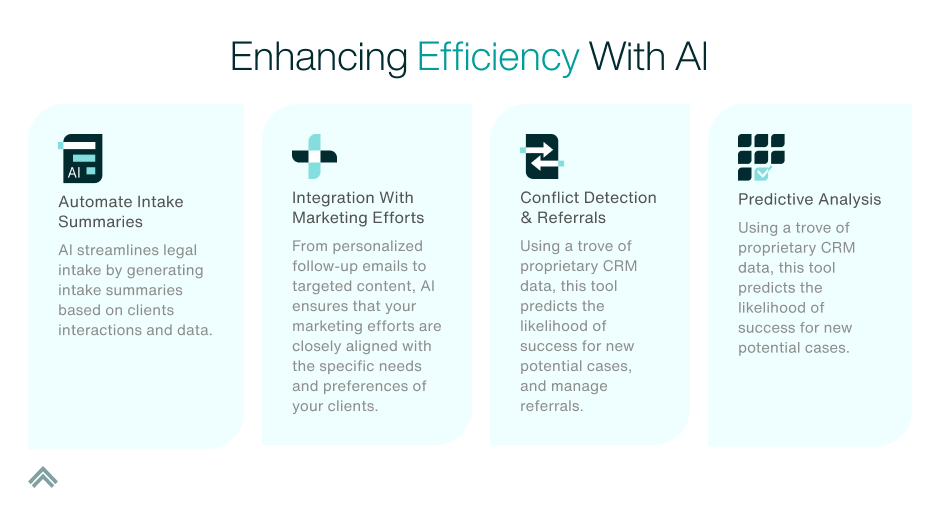Staying ahead often means embracing cutting-edge technology. Among the many advancements, one stands out as a game-changer for law firms, both large and small: Artificial Intelligence (AI). Particularly, AI for lawyers is a growing role in the legal intake process is gaining traction as firms seek to streamline their operations and provide a seamless experience for their clients.
An efficient legal intake system is the cornerstone of client engagement. It sets the stage for the entire attorney-client relationship. When clients first interact with your law firm, their initial experience significantly influences their perception of your services. Thus, making a strong first impression is paramount.
This article will delve into the realm of AI in the legal intake process. We'll explore how leveraging AI can revolutionize your client intake, enhance your firm's efficiency, and ultimately lead to greater client satisfaction. From the fundamentals of legal intake to the innovative applications of AI in high-volume cases, we'll unravel the potential of this technology. So, fasten your seatbelts as we embark on a journey through the transformative power of AI in legal intake.
Utilizing AI for Legal Intake

AI-powered Form Automation: Client intake software employing AI simplifies the initial data gathering process. It automates the completion of various forms, extracting relevant data from documents, emails, or online submissions. For instance, such software can auto-populate client information forms by extracting details from emails or attachments.
Document Data Extraction: These tools use AI to extract critical data from various legal documents and correspondence, saving substantial time and effort. For instance, AI algorithms can identify and pull out key details from lengthy contracts or legal documents, such as names, dates, or specific clauses, facilitating quicker analysis and action.
Enhanced Client Communication: AI-driven chatbots or virtual assistants integrated into these systems can engage with potential clients in real-time. They offer instant responses to common queries, schedule appointments, and gather preliminary case details. For example, a chatbot can efficiently handle basic client inquiries, allowing legal staff to focus on more complex matters.
FIlevine utilizes SidebarAI. SidebarAI is an AI chatbot trained in our Help Center to help folks use and navigate Filevine. You can ask your own questions about Filevine features and functionality to the AI bot, and it will answer from the Help Center.
One good example is Wonderchat; They built an AI Chatbot that can be integrated into your site. You can feed the bot your knowledge base and white papers so it better understands your product to be able to help customers.
CRM Lead Tracking Software:
Intelligent Lead Prioritization: AI algorithms within CRM systems analyze leads based on various parameters like urgency, case type, or likelihood of conversion. This helps prioritize leads for follow-up. For example, an AI-powered CRM might identify a personal injury case with pressing time constraints, ensuring immediate attention from legal staff.
Behavioral Analysis for Client Profiling: These systems analyze client interactions and behaviors to create detailed profiles. They can identify patterns in client behavior, helping legal teams tailor their approach. For instance, the system might identify a potential client’s preferences based on their interaction history, enabling the law firm to customize its services accordingly.
Leads Tracking Software:
Progress Monitoring and Alerts: AI-driven leads tracking software constantly monitors lead progress through various stages of the intake process. It provides alerts or notifications to legal staff when specific actions are required, ensuring no critical steps are missed. For instance, if a potential client has not responded to an initial inquiry, the system can alert the legal team for a follow-up.
Predictive Analytics for Case Viability: These tools utilize AI-driven predictive analysis to assess the probability of a lead converting into a case. For instance, by examining historical data on similar cases and client interactions, these systems can predict the likelihood of success for a particular case, aiding law firms in making informed decisions on whether to take on a case or explore alternatives.
To read more about predictive analysis read our previous blog post about legal predictive analysis and the future of intake management.
Predictive Analysis:
Case Outcome Prediction: AI-powered predictive analysis tools leverage historical case data to forecast the potential outcomes of similar cases. For instance, based on past case data, an AI system can predict the probable course of a personal injury claim, helping lawyers manage client expectations realistically.
Client Need Anticipation: By analyzing patterns in client inquiries, these tools predict client needs. For instance, based on inquiries about estate planning, the system may anticipate related questions or services the client might require, allowing law firms to proactively address those needs.
By harnessing the power of AI infrastructure in these software solutions, legal professionals can streamline the intake process, enhance client engagement, and make more informed decisions, ultimately delivering better services and outcomes to their clients.
Streamlining the Legal Intake Process

As we venture further into the realm of AI-powered legal intake, it's essential to understand how these technological advancements can streamline the process and bring about a more client-focused approach. Here are key components that aid in streamlining the legal intake process:
- AI-Powered Workflows for Contact Status: One of the strengths of AI is its ability to create intelligent workflows. In the context of legal intake, these workflows help in categorizing clients and leads based on their status. For instance, leads can be segmented into categories like "new inquiry," "follow-up required," or "pending case." AI-powered systems can automatically assign leads to the appropriate category, allowing legal staff to prioritize their efforts effectively.
- Different Dashboards for Different Segments and Workflows: An effective AI-driven legal intake system provides customized dashboards. These dashboards offer a segmented view of leads, cases, and clients, tailored to the specific needs of different practice areas or teams within the firm. This segmentation allows for a more focused approach, ensuring that each team or department has quick access to relevant information.
Through AI-driven workflows and customized dashboards, legal intake becomes a streamlined and efficient process. The technology can automatically route leads, update client status, and provide insights on the most crucial actions required. The outcome is a process that adapts to the unique requirements of different segments and workflows, making legal intake more efficient and client-centric.
Enhancing Efficiency with AI

The integration of AI into the legal intake process doesn't stop at categorizing and routing clients. It extends to a range of functionalities that significantly enhance efficiency and productivity. Here are some key aspects of how AI accomplishes this:
- Automating Intake Summaries: Traditional legal intake often involves manual data entry and extensive documentation. AI streamlines this process by automatically generating intake summaries based on client interactions and data. These summaries provide a comprehensive overview of the client's journey, including important details and communication history. With AI-generated summaries, legal staff can quickly grasp a client's status and history, allowing them to be more prepared and responsive.
- Integration with Marketing Efforts: Effective legal intake is not just about acquiring and managing clients but also about nurturing relationships. AI tools can seamlessly integrate with your marketing efforts. This means that data collected during the intake process can be used to enhance client engagement and communication. From personalized follow-up emails to targeted content, AI ensures that your marketing efforts are closely aligned with the specific needs and preferences of your clients.
- Conflict Detection and Inbound/Outbound Referrals: Conflict detection is a crucial aspect of client intake, especially in larger firms handling multiple cases. AI can swiftly analyze your client data to detect potential conflicts of interest. Moreover, AI-driven legal intake systems can manage inbound and outbound referrals, ensuring that clients receive the legal services they need within or outside your firm. This capability is particularly valuable in scenarios involving complex cases, mass torts, and class actions.
- Predictive Analysis: Take the guesswork out of lead qualification with AI-powered Predictive Analysis. Using a trove of proprietary CRM data, this tool predicts the likelihood of success for new potential cases, so you can immediately pursue the most valuable cases. LeadsAI from Lead Docket provides Predictive Analysis for motor vehicle accident cases, with expanded case types coming soon.
Incorporating AI into your legal intake process means embracing automation, integration, and efficient data handling. It transforms what can be a time-consuming, manual process into a dynamic and responsive system that supports both clients and legal staff. The next section of our discussion will highlight additional features offered by AI, including geotracking and high-volume intake for mass torts and class actions.
Real-World Applications of AI
AI's potential in the legal intake process becomes even more evident when we look at its real-world applications. In this section, we'll explore specific scenarios where AI delivers tangible benefits for law firms and clients:
High-Volume Intake: High-volume intake scenarios, where numerous clients or potential cases need processing, can be overwhelming without the right tools. AI streamlines this process by efficiently managing large volumes of data, categorizing cases, and ensuring that each client's needs are met promptly. This capability is invaluable for law firms handling a substantial influx of clients, such as those involved in personal injury or consumer rights cases.
Mass Tort and Class Action Cases: Handling mass tort and class action cases can be intricate due to the high volume of clients and complex legal procedures. AI can play a pivotal role in managing these cases. By automating the intake process, AI ensures that clients are categorized accurately, documents are organized, and communication is efficient. This not only streamlines operations but also enables law firms to provide better service and support to clients involved in these complex cases.
Constant Contact Notifications: Maintaining regular and transparent communication with clients is essential for a positive client experience. AI can facilitate constant contact notifications by automatically sending updates, appointment reminders, and important notifications. This not only ensures that clients are well-informed but also reduces the burden on legal staff, who can focus on high-value tasks while AI handles routine communication.
Geotracking: Geotracking allows law firms to identify where clients are located, which is especially crucial for cases involving multiple jurisdictions or when clients need in-person meetings. AI can manage geotracking, enabling law firms to efficiently schedule meetings, court appearances, and other essential interactions. This ensures that clients receive the support they need, no matter their location.
Automated Intake and Company Contact Records: AI's automated intake process ensures that client information is accurately captured and organized. Furthermore, AI can help maintain comprehensive company contact records, which are essential for legal cases involving businesses and organizations. This detailed record-keeping ensures that legal staff have easy access to important data when needed, improving case management and client support.
By demonstrating these real-world applications, it becomes clear how AI can elevate the legal intake process, making it more efficient, responsive, and client-centric.
Embracing AI for Efficient Legal Intake
In this article, we've delved into the transformative power of artificial intelligence (AI) in the legal intake process. Here are the key takeaways:
Efficiency and Client Satisfaction: AI streamlines the legal intake process, resulting in efficiency and enhanced client satisfaction.
Streamlined Workflows: AI tools, including predictive analysis and automated intake summaries, streamline workflows and minimize oversights.
Real-World Applications: AI finds practical applications in various case types, providing constant contact notifications, geo-tracking, and automated intake.
The future of legal intake is undoubtedly AI-driven. We encourage law firms, irrespective of size, to adopt AI solutions like client intake software and CRM lead tracking tools to improve efficiency and client service. Embracing AI in the legal intake process opens doors to a more client-centric, efficient, and forward-thinking legal practice.
LeadsAI
Ready to experience the future of legal intake and case success analysis firsthand? Unlock the potential of AI and lead tracking with a free LeadsAI demo.
Witness how this cutting-edge tool, powered by machine learning and an extensive database of case data, can revolutionize your firm's decision-making process. Don't miss out on the opportunity to elevate your legal practice.
Click here to schedule your free demo and embark on a journey toward more informed, confident, and successful legal outcomes.